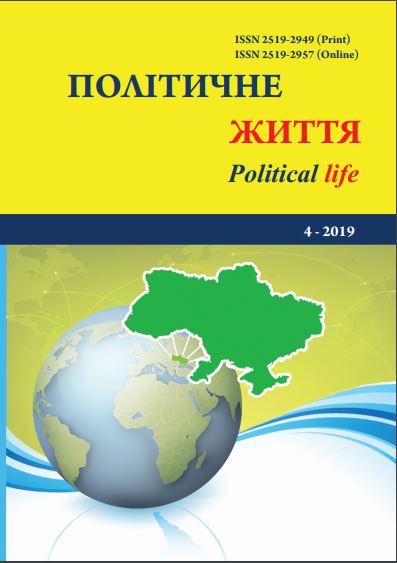М. Бердяєв про національну російську інтерпретацію марксистської концепції революції (досвід герменевтичного аналізу).
DOI:
https://doi.org/10.31558/2519-2949.2019.4.7Ключові слова:
Бердяєв, марксизм, більшовизм, філософія, ідеологія, міф, свобода, особистістьАнотація
У статті проаналізовано інтерпретацію М. Бердяєвим особливостей трансформації марксизму в історичній практиці російського суспільства. Аналізується те, як марксизм, трансформований у більшовицьку ідеологію та філософію, вплинув на суспільну свідомість і саму організацію російського суспільства. Актуальність даного дослідження полягає в безперечній необхідності аналізу того, як західні ідеологічні доктрини трансформуються незахідними суспільствами відповідно до їхніх ціннісних орієнтацій, внутрішніх установок і потреб. Це певною мірою дозволяє зрозуміти те які сенси вкладають політичні еліти незахідних спільнот в поширені на Заході поняття, такі як «революція», «демократія», «свобода» і т. д. і як вони відповідно до цих сенсів вибудовують свою внутрішню та зовнішню політику. У цьому плані великий інтерес представляє герменевтичне тлумачення робіт відомого соціального і політичного філософа М. Бердяєва.
Джерелами для написання цієї роботи стали, передусім, численні твори самого М. Бердяєва, присвячені проблемам історії та історичної есхатології, свободи особистості, духовної детермінації соціальних революцій, та різнобічні політико-філософські твори «срібного століття» кінця ХІХ – початку ХХ ст. Також в науковий обіг був залучений ряд положень з вітчизняних і зарубіжних робіт з проблематики революційної «сучасності та пост-сучасності». В основу цієї статті увійшли також авторські роздуми, опубліковані на сторінках низки вітчизняних наукових журналів.
У викладі доводиться, що російську революцію М. Бердяєв розцінював ії як революцію унікальних умов і унікального змісту. І цим «унікальним умовам і змісту» мог відповідати тільки дуже змінений, трансформований марксизм. Головна претензія ленінізму зводилася до того, щоб стати новою активістською марксистською філософією епохи пролетарських революцій. Він спирався на тезу Маркса і Енгельса про те, що обов’язково відбудеться “стрибок з царства необхідності у царство свободи”.
Ленін і російські комуністи зуміли переконати себе у тому, що для них цей час “великого стрибка” вже наступив. Вони почувають у собі силу і здатність за допомогою “екстремальної” революційної активності змінити увесь світ. Щось подібне ми спостерігаємо і пізніше на прикладі маоістського "великого стрибка".
Відповідно до цієї супер-активістської інтенції більшовицька теорія намагається дати нове тлумачення діалектичному матеріалізму. Основною категорією тут стає категорія само-руху. На матерію переносяться властивості духу – свобода, активність, розум. Активність пролетаріату переробляє середовище і по-своєму формує економіку. Це і є філософія активізму, якої притаманний прометеївській, титанічний пафос.
Борючись проти ідеалізму, більшовики, приховано прагнули надати матерії характеру активного духу. Ортодоксальну і разом з тим активістську радянську філософію Бердяєв визначав також як філософію соціального титанізму. Філософська робота повинна бути “вмонтована” в працю, в соціальне будівництво, повинна його обслуговувати. Титанічна екзальтація революційної волі припускає існування реального світу, над яким відбувається акт його зміни.
Ленінізм також заявляв про нове розуміння свободи. Тут свобода розуміється не як свобода вибору, а як активна зміна життя, як акт, який здійснюється не індивідуальною, а соціальною людиною, після того як нею зроблений вибір. Особистість не має свободи щодо соціального колективу, вона не має особистої совісті та особистої свідомості. Її свобода полягає у винятковій пристосованості до колективу. Але особистість, що пристосувалася і злилася з колективом, одержує величезну свободу і величезну силу стосовно всього іншого світу. На цьому більшовики будували свою стратегію “нової людини”.
Комуністична моральна свідомість роздирається протиріччям між ставленням до минулого та сьогодення, з одного боку, і до майбутнього – з іншого. Єдиного людства ще немає. Є класи експлуататорів і експлуатованих. Тому не може бути і єдиної моралі. Але в майбутньому, після світової комуністичної революції, коли зникнуть класи, утвориться єдине людство – тоді виникне і єдина загальнолюдська мораль. Російський комунізм, вважає М. Бердяєв, якщо глянути на нього глибше, є деформацією російської ідеї, що прийняла в атмосфері війни і соціального розкладання потворні форми.
Загальноісторичний висновок Бердяєва має досить песимістичний і вельми співзвучний нашому політичному досвіду характер: "Революційний міф завжди містить у собі несвідомий обман, і разом з тим без революційного міфу не можна... В цьому сенсі він ніколи не буде здійснений у межах цього світу, в царстві Кесаря".
Посилання
Бердяев Н.А. Истоки и смысл русского коммунизма./ Н.А. Бердяев. – М.: Наука, 1990. – 222с.
Бердяев Н.А. Самопознание. Опыт философской автобиографии./ Н.А. Бердяев. – М.:Мысль, 1991 – 320 с.
Бердяев Н.А. Русская идея. Судьба России / Н.А. Бердяев. – М.: Мысль, 1997. – 542 с.
Кагарлицкий Б.Ю. Политология революции / Б.Ю. Кагарлицкий. – М.: Алгоритм, 2007. – 576 с.
Кара-Мурза С.Г. Манипуляция сознанием / С.Г. Кара-Мурза. – М.: Эксмо, 2006. – 864 с.
Моисеев Н. Как далеко до завтрашнего дня… 1917-1993. Свободные размышления. – М.: «Аспект пресс», 1994 – 304с.
Панарин А.С. Православная цивилизация в глобальном мире. – М., 2002. – 496 с.
Пригожин И., Стенгерс И. Порядок из хаоса: Новый диалог человека с природой / И. Пригожин , И. Стенгерс; пер с англ. – М.: Прогресс, 1986. – 432 с.

